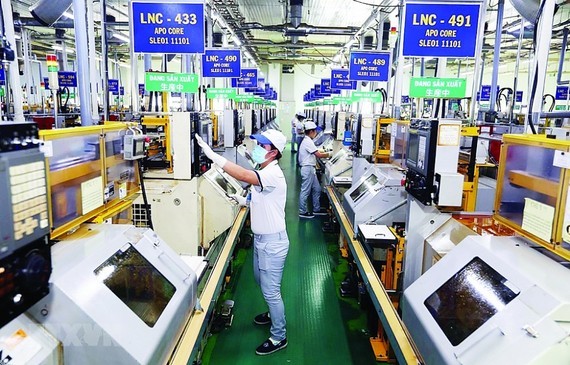
The economy is also bound to be affected as well in coming time, mainly because of lack of capital for enterprises in need, which is one of the biggest challenges that most enterprises are currently facing.
Urgent need for capital
Currently, all enterprises are finding it extremely difficult to access cash flow, both for running their operations as well as for medium- and long-term investments. The situation is dire and a severe crunch in accessing cash is affecting the competitiveness in many industries, as well as the economy of the country. This lack of capital is making it difficult for private enterprises to maintain production, make purchases, and buy the raw materials necessary for production, as well as to retain their work force. This problem has become even more serious because the cash flow of businesses is now exhausted after more than two years of the Covid-19 pandemic.
Due to lack of capital, steel enterprises are currently facing a big crisis as supply is exceeding demand, while export orders and domestic orders have both decreased sharply. Enterprises in support industries also have no cash flow disbursed from banks due to limits set for the credit room, so they cannot accept and sign new contracts. Agricultural enterprises lack the capital to purchase raw materials, while some agricultural and raw materials have a limited purchase period in the last months of the year and the beginning of 2023. Enterprises producing materials for construction have been stopped for most of the contracts to supply materials for the works; while completed contracts cannot be paid because the investor has no cash and cannot borrow from the bank to pay for material or for the works that have been completed.
After more than two years of stagnation following the negative impact of the Covid-19 pandemic, businesses are now facing shortage of capital funds, along with other long-standing issues in terms of governance and technology, making it extremely difficult for most businesses to maintain operations. On the other hand, while Foreign Direct Investment (FDI) enterprises were less affected by the Covid-19 pandemic and do not depend on loans from domestic banks, so they have many advantages. Export data for September 2022 from the General Statistics Office shows that exports of domestic enterprises decreased by 1.6 percent over the same period last year, while FDI enterprises still maintained a growth rate of 14.1 percent over the same period last year. This situation will create an increasingly large gap and disparity between the two economic sectors, reducing competitiveness of enterprises, while the Vietnamese economy will be seriously affected.
As for the challenge of maintaining medium- and long-term capital mobilization channels for investment expansion and business recovery, the effect of decreasing market confidence on real estate businesses has spread to all other types of businesses as well, making the bonds mobilization channel unable to help businesses attract investors in the short term to solve urgent problems. The stock market is also strongly affected, making the difficulties of enterprises more serious. Many large enterprises have also to arrange for capital to buy back bonds before maturity period.
In the context of low market confidence, lack of working capital, and lack of investment flow, assets of enterprises are at risk of being sold off. There may even be a wave of selling off factories and manufacturing units to foreign investors. Typically, Thai enterprises are conducting negotiations to buy and sell off textile and garment factories and production units.
Geopolitical uncertainty
Besides lack of capital, the rising price of energy and input materials is putting huge pressure on enterprises. According to the latest statistics, in the first nine months of the year, the price of raw materials used for production increased by 6.0 percent over the same period last year, the highest increase in the last ten years. The import index also increased very high by 10.7 percent over the same period in 2021, of which imports of production materials accounted for 90 percent. Over dependence on imports has caused businesses to face greater obstacles from the price of raw materials for production use.
According to survey results of Vietnam Report, up to 78.8 percent enterprises have recorded an increase in the cost of raw materials, of which 19.7 percent of enterprises reported a significant increase in this expenditure. Nearly 50 percent of businesses predict this situation will continue until the end of 2023, and 38 percent of businesses think that this situation will last much after 2023. Previously, the disruption in the supply chain during the Covid-19 pandemic was forecast to improve when entering the second quarter of 2022. However, the emerging world geopolitical uncertainties and China's Zero Covid-19 policy have raised concerns about further disruption in the supply chain that could extend into 2023 and beyond.
In addition to geopolitical concerns, the instability in the financial and monetary situation in the world will also significantly impact the Vietnamese business community because the openness of the economy is as high as 200 percent of GDP, while the economic resistance and competitiveness are still limited. Most businesses said that they are under pressure from the increasing exchange rate, and nearly 60 percent of enterprises are facing difficulties in capital sources and high interest rates. Along with the challenges of the exchange rate, interest rate, and inflation, purchasing power in major economies has decreased sharply which has led to a decrease in the number of orders from export enterprises. The factors of natural disasters and pandemic are no longer the top difficulties as a year ago, but they still affect the operation of 64.1 percent of enterprises. These are huge challenges that businesses will face throughout 2023.
























